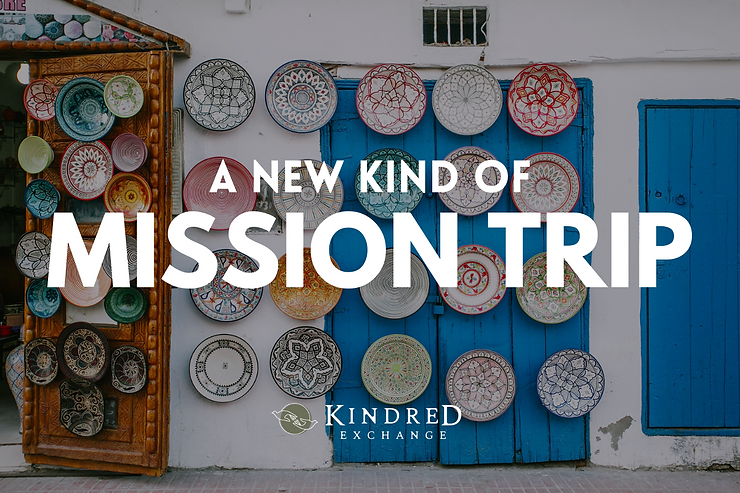A New Kind of Mission Trip
I sat this week with a man visiting the United States from South America. He was here on a short trip to renew partnerships and encourage donating to his non-profit employer, a vibrant humanitarian organization sponsoring children’s education and church planting in his home country of Nicaragua.
Throughout the last 20 years of my cross-cultural experiences, I’ve witnessed a trend when individuals from outside the U.S. interact with Americans.
There is a humility, first of all. Foreign nationals may be the leader of their company, the chief of their village, or the most influential member of their community. But they never lead with this when speaking to a U.S. citizen.
Their speech is one of honor, their body language one of welcome, and their posture one of hospitality.
Americans, on the other hand, are naturally trained direct speech. We say what we want to say and with as much power and confidence as we wish. We compare the wealth of the U.S. to poverty we’ve seen abroad, and make sweeping comparisons of “how good we have it” to the challenges facing other nations around the globe.
We assume, more often than not, that living the American Dream is the dream of the rest of the world, and that our visiting the developing world is coupled with a duty to replicate our societal values for wealth and progress.
But so often, we assume wrong.
It’s remarkable how carried away we can become in discussing wealth and progress that we forget to pause, consider the poverty within our own nation, and honor the richness of cultures different from our own.
In every society, there is poverty and there is wealth. It’s just not always measured in gold coins or paper bills.
Even with the best of intentions, Western evangelists struggle to untangle their mission from the language of power and philanthropy. I’ve noticed that when I work harder to connect through the language of honor, however, foreign nationals relax into a relationship of compatibility rather than one of patronage.
It is a physiological warmth—a feeling of shared humanity and emotional safety—that allows for deep connection with our neighbors across cultures.
I witnessed that warmth this week as I spoke with Roger about his hopes and dreams for his country. I watched his energy shift as he shared about the doors that open for families when mothers and fathers are supported to start businesses and can bring home a dignified income.
I watched his shoulders relax, his smile widen, and his eyes dance as he talked about the beauty and the hope he found in his homeland. And when I spoke to the impact he was making and honored his pouring out for his own community, his body language opened up to receive my compliments.
The pressure was off to somehow impress me.
We were no longer the “Big American” and the “Poor Nicaraguan” in the room…we were two individuals, concerned with the marginalized of the world, both committed to show up for our neighbors, whether local or global.
In the world of Evangelical Missions, there has been a disturbing disconnect between missionaries and receiving cultures for decades.
Loads of evidence has mounted to prove our short-term trips are often futile, our solutions are not sustainable, and our gospel is rarely contextualized.
At Kindred Exchange, we seek to reimagine the way we share our faith across cultures. We want the relationships we develop across the globe to be bathed with honor, dignity, and an openness to nuance.
We want to enter other people’s spaces with hospitality, posturing our hearts to receive the beauty of other cultures and ways of life rather than assuming our own norms are superior.
We aren’t giving up on missions - we’re standing firm in our belief that the Gospel of Christ is Good News for every tribe and every tongue.
We are, however, giving up an American Jesus we’ve fabricated to look and talk just like us out of our own comfort.
And we’re recommitting to a curiosity about a God who designed mission and reveals His character to diverse cultures and identities. We are seeking to know Him better through new and unique experiences that connect us with humankind across the globe.
What if…
We traveled abroad to see what God was already doing there, rather than what we could do there?
We prayed for God to move amongst His people, rather than assuming the burden of salvation for those we’ll never be able to reach?
We centered others in the heart of the Gospel, rather than expecting everyone to encounter God in the same way we have?
In 2014, I sat with a small group of Believers in the most religiously persecuted country of Southeast Asia. In this country, less than 5% of the population claims Christianity. But one of the young men in the room shared his heart for evangelism; his prayer was that his nation would become a sending nation of missionaries to surrounding countries soon.
His dream was to share Good News with people across cultures, and it is his face that I see when I imagine modern missions.
Join us as we redesign the way we share our faith appropriately, sustainably, and honorably across national borders. We want to witness a new kind of mission trip, and we want to pave a path forward for churches with short-term teams and long-term missionaries to feel proud of the way they have carried the Gospel of Christ on their journeys.
-
To join us on a Kindred Exchange trip, visit www.kindredexchange.co/trips.




